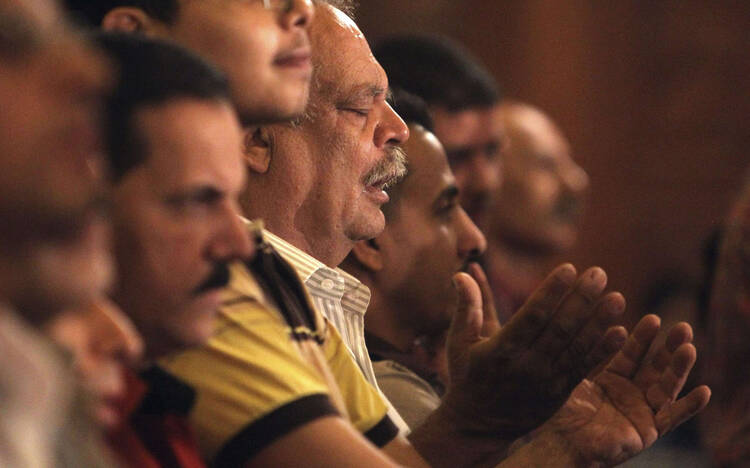Faith in Sinai
“This is a great day of joy for Catholics in Egypt,” said the Coptic Catholic Bishop Makarios Tewfik of Ismailia, hailing the consecration on Feb. 15 of the first Coptic Catholic church ever built in Sinai. The church will accommodate the worship needs not only of the tourists who flock to the region’s spectacular coral reefs but also of the sizable community of Filipino guest workers employed in the tourism, hotel and construction industries on the peninsula. A large foreign workforce in Bahrain has likewise spurred the construction of a new Catholic church there, slated for completion in 2016 (Current Comment, 4/14/14).
Before the church was built, people in Sinai were able to worship only in their homes or makeshift chapels. Financial assistance was provided by Aid to the Church in Need, an international Catholic charity. Work on the church had been ongoing since 2003, and the foundation stone was laid in 2005; but as with any ambitious project, roadblocks popped up. As Bishop Makarios noted, the logjam was broken when an influential advocate, who had been taught by Catholic sisters, came to the church’s assistance. Thanks to the support of Suzanne Mubarak, wife of the deposed Egyptian president, the church was finished and given the name of her choosing: Our Lady of Peace.
On the same day that the church was consecrated, an Islamic State affiliate in Libya released a video showing the beheading of 21 Orthodox Coptic Egyptians. Our Lady of Peace stands as a rebuke to such evil and shows, in a concrete way, that death will never prevail over life.
The Right to Rest
Across the country, local governments seeking to revitalize downtown areas, attract tourists or cater to wealthier residents have increasingly turned to laws that criminalize behavior associated with homelessness. A report by the law school of the University of California, Berkeley, published in February found that 58 cities in that state have enacted over 500 restrictions on activities like resting in public places, living out of a car, panhandling and sharing food, in what researchers call a municipal “race to the bottom.”
No one is winning this race—not taxpayers, who foot the bill for the costly enforcement of such measures, and certainly not the homeless people who are arrested or fined for basic acts of survival. If the goal is not just to clean up parks and sidewalks but to end homelessness, criminalization may in fact further entrench the problem. A criminal record can make it even more difficult for men and women without stable housing to get a job, public benefits or supportive housing that could help get them off the streets. Some public officials seem to have realized this. In California, state lawmakers are considering the Right to Rest Act, which would guarantee the right to rest, eat and perform religious observances in public spaces.
A bill of rights for homeless people places an obligation on all residents: to confront the plight of those living on the margins. Proven, cost-effective solutions to homelessness exist, including housing-first strategies, collaboration between health and social service workers and law enforcement, and alternative courts. But first we have to see the problem.
The Rights of Unions
After a divisive and very public argument over public union contracts four years ago, Wisconsin finds itself embroiled in another scorched-earth debate. With the backing of Gov. Scott Walker, the state legislature adopted a “right to work” law that allows private-sector workers to opt out of a union—and union dues—even while enjoying the benefits of union membership. Twenty-four states have passed similar laws, and Missouri, Illinois and Kentucky are also considering “right to work” legislation. Supporters argue that these laws empower individual workers, but their long-term effects are not difficult to predict. The more people opt out of paying union dues, the weaker the unions will be.
The Wisconsin Catholic Conference released a public statement offering three questions to guide the debate. They included, “Does [the proposed law] protect the natural right of workers to assemble and form associations?” The statement stopped short of offering an answer, which might have been the prudent course at a moment when the state’s electorate was extremely polarized. Then again, the beleaguered union movement could use all the help it can get. Last year, the Interfaith Partnership of Greater St. Louis, to which Archbishop Robert Carlson belongs, published a statement calling right-to-work laws “obviously and admittedly anti-union in their intent and render impossible or at least weaken the process of collective bargaining between management and labor.” From the standpoint of Catholic social teaching, these laws are problematic: they privilege the rights of the individual over the good of the group.
Unions are imperfect institutions, but Catholics should resist political attempts to make them obsolete. As Pope Benedict XVI wrote in “Caritas in Veritate,” “the promotion of workers’ associations that can defend their rights must therefore be honored today even more than in the past.”








